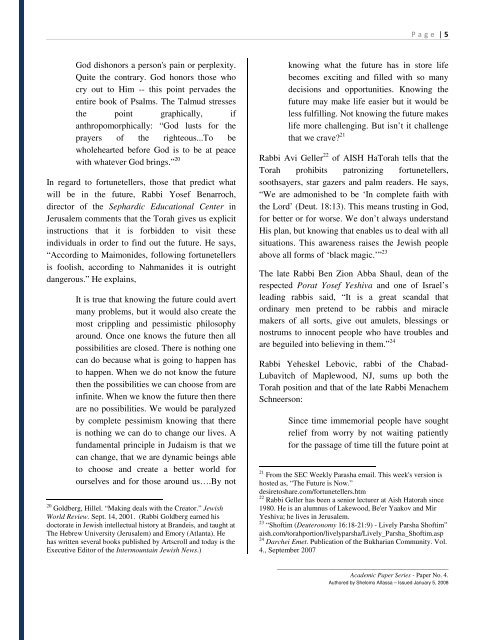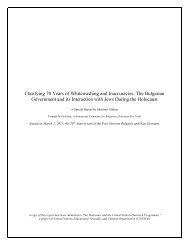Fortune Telling and Palm Reading are Not Part of Judaism - Alfassa
Fortune Telling and Palm Reading are Not Part of Judaism - Alfassa
Fortune Telling and Palm Reading are Not Part of Judaism - Alfassa
You also want an ePaper? Increase the reach of your titles
YUMPU automatically turns print PDFs into web optimized ePapers that Google loves.
God dishonors a person's pain or perplexity.<br />
Quite the contrary. God honors those who<br />
cry out to Him -- this point pervades the<br />
entire book <strong>of</strong> Psalms. The Talmud stresses<br />
the point graphically, if<br />
anthropomorphically: “God lusts for the<br />
prayers <strong>of</strong> the righteous...To be<br />
wholehearted before God is to be at peace<br />
with whatever God brings.” 20<br />
In regard to fortunetellers, those that predict what<br />
will be in the future, Rabbi Yosef Benarroch,<br />
director <strong>of</strong> the Sephardic Educational Center in<br />
Jerusalem comments that the Torah gives us explicit<br />
instructions that it is forbidden to visit these<br />
individuals in order to find out the future. He says,<br />
“According to Maimonides, following fortunetellers<br />
is foolish, according to Nahmanides it is outright<br />
dangerous.” He explains,<br />
It is true that knowing the future could avert<br />
many problems, but it would also create the<br />
most crippling <strong>and</strong> pessimistic philosophy<br />
around. Once one knows the future then all<br />
possibilities <strong>are</strong> closed. There is nothing one<br />
can do because what is going to happen has<br />
to happen. When we do not know the future<br />
then the possibilities we can choose from <strong>are</strong><br />
infinite. When we know the future then there<br />
<strong>are</strong> no possibilities. We would be paralyzed<br />
by complete pessimism knowing that there<br />
is nothing we can do to change our lives. A<br />
fundamental principle in <strong>Judaism</strong> is that we<br />
can change, that we <strong>are</strong> dynamic beings able<br />
to choose <strong>and</strong> create a better world for<br />
ourselves <strong>and</strong> for those around us….By not<br />
20 Goldberg, Hillel. “Making deals with the Creator.” Jewish<br />
World Review. Sept. 14, 2001. (Rabbi Goldberg earned his<br />
doctorate in Jewish intellectual history at Br<strong>and</strong>eis, <strong>and</strong> taught at<br />
The Hebrew University (Jerusalem) <strong>and</strong> Emory (Atlanta). He<br />
has written several books published by Artscroll <strong>and</strong> today is the<br />
Executive Editor <strong>of</strong> the Intermountain Jewish News.)<br />
P a g e | 5<br />
knowing what the future has in store life<br />
becomes exciting <strong>and</strong> filled with so many<br />
decisions <strong>and</strong> opportunities. Knowing the<br />
future may make life easier but it would be<br />
less fulfilling. <strong>Not</strong> knowing the future makes<br />
life more challenging. But isn’t it challenge<br />
that we crave? 21<br />
Rabbi Avi Geller 22 <strong>of</strong> AISH HaTorah tells that the<br />
Torah prohibits patronizing fortunetellers,<br />
soothsayers, star gazers <strong>and</strong> palm readers. He says,<br />
“We <strong>are</strong> admonished to be ‘In complete faith with<br />
the Lord’ (Deut. 18:13). This means trusting in God,<br />
for better or for worse. We don’t always underst<strong>and</strong><br />
His plan, but knowing that enables us to deal with all<br />
situations. This aw<strong>are</strong>ness raises the Jewish people<br />
above all forms <strong>of</strong> ‘black magic.’” 23<br />
The late Rabbi Ben Zion Abba Shaul, dean <strong>of</strong> the<br />
respected Porat Yosef Yeshiva <strong>and</strong> one <strong>of</strong> Israel’s<br />
leading rabbis said, “It is a great sc<strong>and</strong>al that<br />
ordinary men pretend to be rabbis <strong>and</strong> miracle<br />
makers <strong>of</strong> all sorts, give out amulets, blessings or<br />
nostrums to innocent people who have troubles <strong>and</strong><br />
<strong>are</strong> beguiled into believing in them.” 24<br />
Rabbi Yeheskel Lebovic, rabbi <strong>of</strong> the Chabad-<br />
Lubavitch <strong>of</strong> Maplewood, NJ, sums up both the<br />
Torah position <strong>and</strong> that <strong>of</strong> the late Rabbi Menachem<br />
Schneerson:<br />
Since time immemorial people have sought<br />
relief from worry by not waiting patiently<br />
for the passage <strong>of</strong> time till the future point at<br />
21 From the SEC Weekly Parasha email. This week's version is<br />
hosted as, “The Future is Now.”<br />
desiretosh<strong>are</strong>.com/fortunetellers.htm<br />
22 Rabbi Geller has been a senior lecturer at Aish Hatorah since<br />
1980. He is an alumnus <strong>of</strong> Lakewood, Be'er Yaakov <strong>and</strong> Mir<br />
Yeshiva; he lives in Jerusalem.<br />
23 “Sh<strong>of</strong>tim (Deuteronomy 16:18-21:9) - Lively Parsha Sh<strong>of</strong>tim”<br />
aish.com/torahportion/livelyparsha/Lively_Parsha_Sh<strong>of</strong>tim.asp<br />
24 Darchei Emet. Publication <strong>of</strong> the Bukharian Community. Vol.<br />
4., September 2007<br />
_____________________________________________________<br />
Academic Paper Series - Paper No. 4.<br />
Authored by Shelomo <strong>Alfassa</strong> – Issued January 5, 2008



